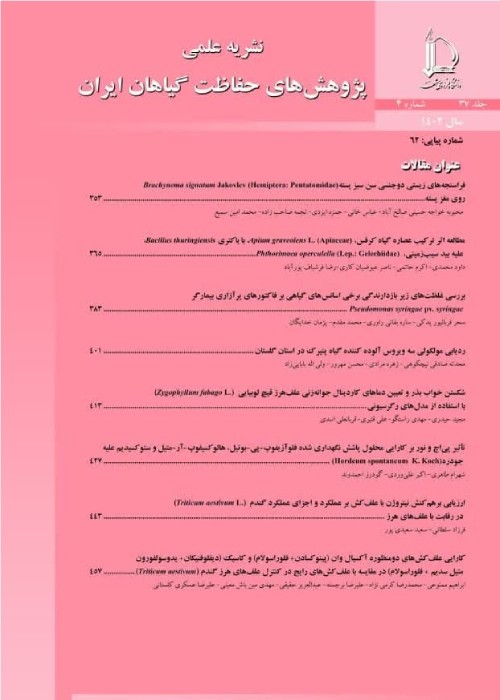Evaluation of Nitrogen-herbicide Interaction on Wheat Yield and Yield Components in Competition with Weed
Increasing the competitiveness of crops through the use of nitrogen fertilizers and herbicides is an important part of integrated weed management. In recent years, concern over the environmental effects, costs of cultivation, and long-term efficacy of conventional weed management systems have led to increasing number of researchers to seek alternative systems that are less reliant on herbicides and more reliant on ecological processes. This research was conducted with the aim of studying the interaction of different levels of herbicide and nitrogen on weed control and wheat yield improvement.
A field study was conducted at Agronomy Research Farm, Islamic Azad University during 2018-19 with factorial arrangement in a randomized complete block design with four replications. Four herbicide levels (0, 32, 40 and 48 g. metsulfuron-methyl plus sulfosulfuron. ha-1) were applied as early post-emergence application (30 DAS) and five nitrogen levels (0. 60, 120, 180 and 240 kg.ha-1). Hand weeding (control) was applied to compare other treatments.
Results showed that nitrogen × herbicide interaction was significant on grain yield and dry matter of wheat and weed. Grain yield and dry matter of wheat significantly decreased with increasing nitrogen at lower herbicide levels. The effect of herbicide treatment on 1000 grain weight was significant. So that increasing the dose of herbicide up to 48 g.ha-1 increased 1000 grain weight as much as the control treatment. The effect of nitrogen and herbicide on the number of spikes was also significant. By increasing the amount of nitrogen up to 120 kg.ha-1, the number of spike increased. The results showed that the mutual effect of nitrogen and herbicide on grain yield and dry matter of wheat and weed was significant. With the increasing of nitrogen, the grain yield and dry matter of wheat increased in higher herbicide doses and decreased in lower dosed. At low levels of nitrogen, no significant difference was observed between herbicide levels in terms of grain yield and dry matter of weeds, which indicates the higher competitiveness of wheat at low levels of nitrogen and no need to use herbicides. At the same time, at high levels of nitrogen, wheat yield increases at much slower rate than weeds. Therefore, in terms of nitrogen consumption, we will have to use more herbicides in intensive cropping system.
Negative and significant correlation of dry matter of wheat and weeds showed the existence of a close relationship in the interaction of treatments. Therefore, it is possible to use the combination of nitrogen substitutes and herbicides in the integrated management of wheat weeds.
In general, it was observed in this research that with the increase of nitrogen fertilizer, the competitive ability of wheat against weeds decreases, probably due to the higher efficiency of nitrogen consumption in weeds. If weeds are not properly controlled, we will see a significant decrease in wheat grain yield at high nitrogen levels.
- حق عضویت دریافتی صرف حمایت از نشریات عضو و نگهداری، تکمیل و توسعه مگیران میشود.
- پرداخت حق اشتراک و دانلود مقالات اجازه بازنشر آن در سایر رسانههای چاپی و دیجیتال را به کاربر نمیدهد.


